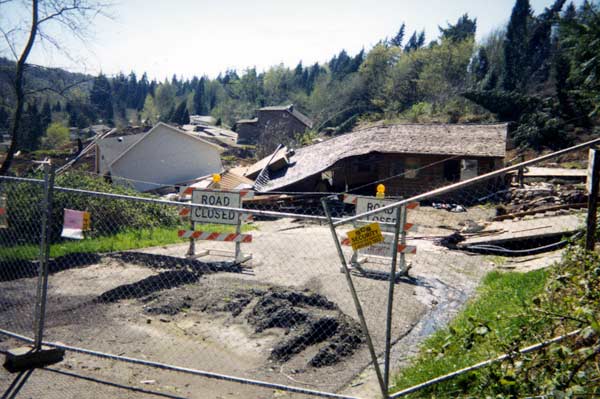A history of landslides in Washington
Part of the neighborhood damaged by a slow-moving landslide in Kelso in 1998-99. (Photo courtesy of Washington State Archives)
Last weekend’s massive landslide near Oso in Snohomish County is a sad and tragic reminder that we live in a state where devastating landslides can and do happen, often resulting in the loss of property and, sometimes, human life. The combination of hilly or mountainous terrain, unstable ground and heavy rainfall make many parts of Washington prone to slides.
Washington has seen several notable landslides in recent years. Some of them include:
October 11, 2009 – A massive landslide in the Nile Valley of Yakima County closed a section of Highway 410 west of Naches, destroying two homes, and changing the flow of the Naches River.
December 3, 2007 – The same storm that caused widespread flooding in western Lewis County also caused a landslide west of Pe Ell, resulting in the blockage of Highway 6 and destroying two houses and a garage.
January 2006 – A landslide blocked the North Fork of the Stillaguamish River located between Arlington and Darrington. Three-hundred yards of steep hillside collapsed, sending several hundred thousand cubic yards of soil, mud and trees into the river.
February 1998 to early 1999 – The slow-moving Aldercrest-Banyon landslide occurred in the east Kelso neighborhood of Aldercrest, one of the worst urban landslides in U.S. history in terms of cost. (The photo above, provided by our State Archives, shows some of the damage caused by this landslide.)
Early February 1996 – A massive rainstorm caused numerous landslides throughout Washington, including Magnolia Bluff in Seattle.
Of course, Washington has experienced notable landslides in earlier times. One occurred on Dec. 15, 1872 when a major earthquake struck , with the epicenter near Lake Chelan. The quake caused extensive landslides in slide-prone areas of the Columbia River, including one between Entiat and Winesap that blocked the Columbia for several hours.
